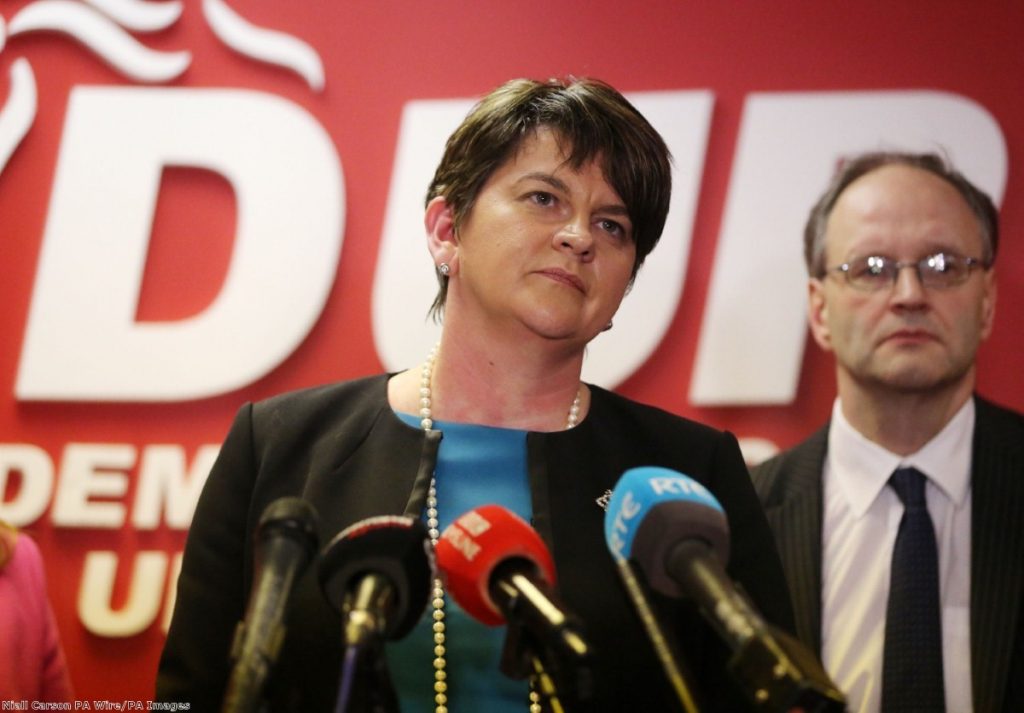By Kevin Meagher
What do you think would happen if the leader of Hampshire County Council (population, 1.8 million), introduced a subsidy scheme to encourage businesses to switch to renewable energy only for it to go disastrously wrong, racking up a liability of, say £500m?
Their position would be utterly untenable, wouldn't it? Politically, they would be finished. Dropped down the nearest well in short order. But that's essentially what's just happened in Northern Ireland (again, population, 1.8 million).
As enterprise minister in 2012, Arlene Foster (who went on to become first minister just 12 months ago) introduced the Renewable Heat Incentive (RHI) to encourage businesses to switch to green energy boilers. So far, so worthy.


Only there were no caps on what recipients could claim, resulting in a liability over the next twenty years that seems to grow by the day. £400m. £500m. Even £1 billion. 'Burn to earn,' so to speak. As cock-ups go, it's an absolute howler. Yet, inexplicably, Foster has refused to go.
The closest comparison that springs to mind is with Norman Lamont. He was, of course, chancellor of the exchequer on Black Wednesday in September 1992, losing tens of billions to currency speculators trying to keep Britain in the Exchange Rate Mechanism. He lasted a few more months in office, in disgrace, before eventually being sacked.
That's because some things in politics are just too big to come back from. Arlene Foster, however, disagrees. She is the poster girl for brazening out a scandal. Doubtless she would call me a 'misogynist' for that comparison, as she has done to anyone who has the temerity to point out that she really should feel compelled to resign.
But Northern Ireland is a place apart and plays to different rules and the executive she co-led until this week, with Sinn Fein's Martin McGuinness, had no real mechanism for removing her.
Unless, of course, McGuinness quit, and, under the terms of the Good Friday Agreement, precipitated by a collapse of the whole executive and fresh Assembly elections, a scenario Sinn Fein had been keen to avoid.
After all, they are not in direct electoral competition with Foster's Democratic Unionists (given Northern Ireland's balkanised electoral battleground) and have absolutely nothing to gain from fresh elections.
However, the first minister's reckless and tin-eared handling of this crisis eventually forced McGuinness's hand.
For weeks, he has been politely pointing out to Foster that public opinion will simply not accept a shrug of the shoulders about RHI, urging her to temporarily step aside and allow an independent investigation into the matter.
It's the absolute least that voters expect, yet Foster has been the acme of defiance. On Monday she accused Sinn Fen of 'playing chicken' over the issue. It seemed to have been the final straw, as a few hours later, McGuinness announced his resignation.
His letter contained a decade's worth of frustration at the game-playing and foot-dragging of DUP ministers in government and for never entering into the spirit of reconciliation and partnership that the times demand:
'The equality, mutual respect and all-Ireland approaches enshrined in the Good Friday Agreement have never been fully embraced by the DUP. Apart from the negative attitude to nationalism and to the Irish identity and culture, there has been a shameful disrespect towards many other sections of our community. Women, the LGBT community and ethnic minorities have all felt this prejudice.'
It is now up to James Brokenshire, the Northern Ireland secretary, to pick up the pieces of this quite avoidable mess and announce the date for fresh elections. While he is doing so, he might question why he didn't intervene earlier in order to keep the show on the road. After all, this issue gained terminal velocity before Christmas and this week's events were grimly predictable, yet there was no sign of Brokenshire playing a part in resolving what he himself told the House of Commons yesterday was a 'grave' situation.
Northern Ireland has been fairly quiet, from a Westminster point of view, these past few years, but Theresa May could yet learn the hard way how much time and effort it takes to get things back on track.
So, after weeks of frustration and annoyance with Foster's antics, fair-minded people will be left to savour the schadenfreude of the DUP explaining themselves on the doorstep. She will find her rivals in the Ulster Unionists and hardline Traditional Unionist Voice parties breathing down her neck, keen to capitalise on what is, in essence, garden variety ministerial incompetence from Foster.
Some 'orange on orange' bloodletting seems likely, with DUP candidates left wondering why they didn't just remove Foster themselves and avoid this unnecessary election. Stepping aside for a period to allow an investigation was the easy way out.
Arlene Foster has previously welcomed comparisons of her style with Margaret Thatcher or Angela Merkel. Unshowy but competent. But the RHI scandal has destroyed that image. She is not competent. The DUP is loath to have people tell it what to do, but I suspect even they will think twice before re-nominating her as their candidate for first minister.
Kevin Meagher was former Special Adviser to the last Labour Government's Northern Ireland Secretary, Shaun Woodward and author of ‘A United Ireland: Why unification is inevitable and how it will come about,’ published by Biteback
The opinions in politics.co.uk's Comment and Analysis section are those of the author and are no reflection of the views of the website or its owners.









